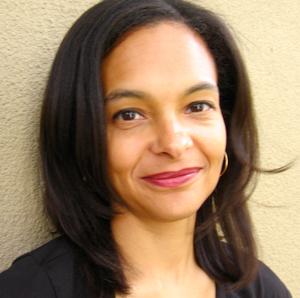The last time Suzette Mayr unleashed a surreal jolt of one-of-a-kind creativity, her vehicle (2004’s Venous Hum) was a frenzied comic plot that mixed lesbo-centric suburban angst — workaholism, adultery, boredom — with outlandish characters that included a cannibal mother and a literally bloodsucking teacher.
The University of Calgary prof has returned to her hometown’s outskirts for her fourth novel, Monoceros. While on the surface the novel looks like another delirious romp — it features a drag performer named Crepe Suzette, a campy sci-fi TV show called Sector Six (in which fearless but sexy Colonel Shakira pilots the Starship Monoceros through the stars), and a jaded divorcee teacher who recalls none other than The Simpsons’ Edna Krabappel — the tone is actually sad and flecked with despair.
NEW: Suzette Mayr just won the biggest literary prize in Canada
Monoceros opens with a suicide. Facing increasing bullying and heartache at school and finding no help from the adults he confides in, Grade 12 student Patrick Furey hangs himself in his bedroom.
Over the course of the 60 bite-sized chapters that follow, Mayr examines the impact of Furey’s death on his community — from the boy’s chief bully, Petra Mai, and his closeted guidance counsellor, Walter, to his tormented mother and pot-smoking father. While there are scatterings of comedy, the novel is a sobering meditation on human nature.
In dedicating the novel to the “memory of DS and others like him,” Mayr is drawing from her own life.
“This novel came about because about eight years ago, my wife was working as a teacher in a Catholic high school where a 17-year-old boy in Grade 12… committed suicide after being bullied for being gay,” Mayr explains. “While she worked at this school she was necessarily in the closet because she was a lesbian, and she would have lost her job if she’d been outed. She didn’t know the boy except by sight, but his death affected her profoundly — to the point that she quit her job, made a radical career change and decided to dedicate her life to examining homophobia in publicly funded Canadian Catholic schools.
“Witnessing her grief at home in private and her inability to express this grief in a proper, public way was a real education for me, and I wondered a lot about how the other closeted teachers and staff in the school were coping.”
Mayr adds, “There was also very little public discussion of his death because it was a suicide, and there was fear of copycat behaviour by other students. I was also surprised at my own grief — I really didn’t know DS, but it felt like a palpable, immediate loss. Kind of like a fellow soldier had fallen in battle. Coincidentally, around the same time on the other side of town, a senior high school student died in a freak football accident, and his death was all over the local papers; there were impromptu shrines made up of teddy bears and flowers for him at his school. Never in my life have I wanted to write about teenage boys — I grew up with two younger twin brothers and I’d had more than enough of dealing with teenage boy nuttiness and narcissism in my life — but it struck me as just so grossly unfair that people were working so hard to remember the boy who’d died in the freak accident, while for DS there was only silence, or a very limited, in-school-only discussion about him.
“As hard as I tried, I couldn’t get DS out of my mind. I couldn’t help but try to investigate through writing the emotional turmoil my wife was going through.”
The focus of Mayr’s novel is a hot-button issue, but it’s one she has been mulling over for years.
“I started this book eight years ago,” she says, “long before Glee and the It Gets Better campaign. What I really wanted to avoid from the very beginning was a book that looked like it was treating suicide in a flippant way — I realized early on that the book would have its funny moments, but that the humour would have to be organic, it had to be sympathetic. I also really, really didn’t want to end up creating a text about a dead, doomed LGBTQ person like in Brokeback Mountain… I didn’t want this story about a dead gay boy to fit into that strange, quasi-genre of queers being punished… for living their lives and expressing themselves honestly.”
With its emphasis on suicide and closeted school officials, some may think that Mayr’s story denies Canada’s history of progressive sexual politics. Mayr believes Canada has more than one simple story.
“In Alberta, Ontario and Saskatchewan there is still a publicly funded, Catholic, separate school system where it is perfectly all right to fire a teacher or staff member for being LGBTQ, where it’s perfectly all right to forbid students from creating gay-straight alliance clubs, and where homophobia is accepted as an institutional fact of life even though the schools are being funded with tax payers’ money. Canada is really pathetic in this way. It’s just gross and embarrassing and a big ugly secret.”
Even with its grim subject, Monoceros contains both hope and wild comic exuberance.
“I really believe in that notion that ‘comedy is tragedy at a distance.’ I think that a text that is purely tragedy or purely comedy isn’t a true representation of life, and I just can’t write that way.
“There are so many times when I’ve witnessed the two genres mingling in real life — people giggling during funerals, for example. It might be because of nervousness, or maybe something is just genuinely funny. I also have to admit that my own sense of humour is a bit kinked, and I don’t necessarily find things funny that other people find funny.”

 Why you can trust Xtra
Why you can trust Xtra


